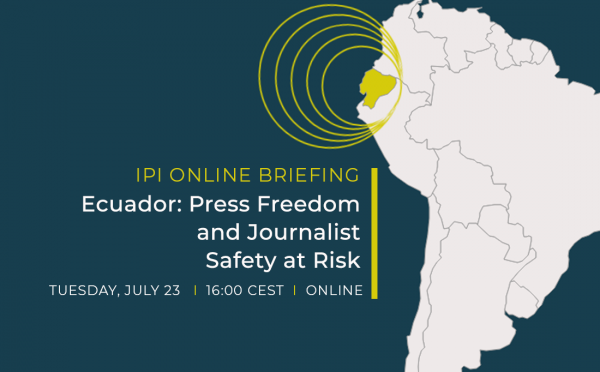VIENNA—The International Press Institute (IPI) today expressed concern at the United States government’s attempt to force a New York Times reporter to disclose his source of information about a Central Intelligence Agency (C.I.A.) effort to sabotage Iran’s nuclear program at the end of the Clinton administration.
The newspaper reported yesterday that prosecutors on Monday served a subpoena on reporter and author James Risen, ordering him to appear in court 12 September to testify at the trial of former C.I.A. officer Jeffrey Sterling.
The government alleges that Sterling provided Risen classified information that appeared in Risen’s 2006 book, “State of War: The Secret History of the C.I.A. and the Bush Administration.” Sterling was charged as part of an Obama administration crackdown on officials accused of disclosing restricted information to journalists.
According to The New York Times, civilian and military prosecutors have charged five people in cases involving leaking information since President Obama took office, more than all previous presidents combined.
Two of those cases – the case against Stirling and a case against former National Security Agency official Thomas Drake, who faces trial in several weeks on charges of providing classified information to The Baltimore Sun about cost overruns and mismanagement at the agency – began under the Bush administration.
Cases brought under the Obama administration include charges against a former Federal Bureau of Intelligence translator who pleaded guilty to leaking classified documents to a blogger, and the case against former soldier Bradley Manning for allegedly leaking a massive trove of classified documents to WikiLeaks.
IPI Director Alison Bethel McKenzie condemned news of the subpoena against Risen.
“It is completely unacceptable that journalists might not be able to protect the source of information they obtain in the process of gathering news,” she said. “The U.S. government, and President Obama, have both a constitutional obligation not to take any steps that infringe upon the freedom of the press, and a moral obligation to fight any attempts – by law, regulation or any other action – that would do so.”
Monday’s subpoena represents the third time the government has tried to compel Risen’s testimony in the Sterling case. A first subpoena, issued in grand jury proceedings, expired while Risen fought a legal battle against it, and the journalist last year managed to convince a judge to quash a second subpoena, also during the grand jury phase.
Risen told The New York Times that he would fight the latest subpoena, commenting that the case was “a fight about the First Amendment and the freedom of the press.”
The newspaper reported that the government has argued that the First Amendment – which bars any law abridging the freedom of the press – does not give Risen the right to avoid testifying about his confidential sources in a criminal proceeding.
Prosecutors said Risen was a witness and should be compelled to provide information to a jury “like any other citizen.” They alleged that there was no basis to conclude that Risen “is being harassed in order to disrupt his relationship with confidential news sources.”
If the latest subpoena is not quashed and Risen declines to answer prosecutors’ questions, he could face jail time for contempt of court.
Bethel McKenzie said the case highlighted the need for the United States to adopt a federal shield law giving reporters protection against being forced to disclose confidential information or sources obtained during the news gathering or dissemination process.
Many individual states in the United States have shield laws, but they vary by degree from state to state depending on the proceedings involved.


